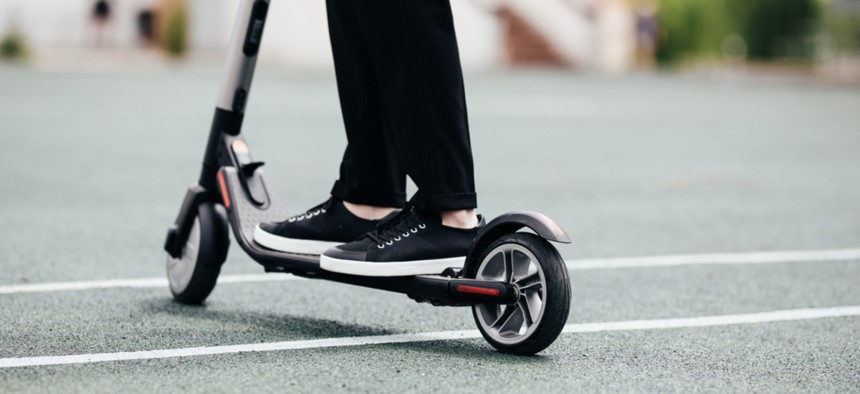Collaboration Key to Managing Scooters, Bike Shares

Scooters have quickly become the most popular form of micromobility, defined as app-based transportation that serves one user at a time. Shutterstock
Proactively communicating with transportation companies can help ease the pain of integration, according to a new report from the National League of Cities.
Collaboration and proactive planning can help cities keep pace with the growing popularity of bike shares and electric scooters, according to a new report from the National League of Cities.
“Ultimately, these systems are an increasingly important part of city transit and mobility systems, as they help people move around cities more seamlessly and efficiently,” says the “Micromobility in Cities” guide. “The value is apparent and big questions, if they do arise, center around how these new systems—which are typically run by private operators—interact with existing laws and regulations.”
Micromobility is defined in the report as app-based transportation that serves one user at a time, most commonly via bike shares and electric scooters. The industry is booming—riders took 84 million trips on micromobility systems last year, about half of them on scooters, according to data from the National Association of City Transportation Officials. That’s a recent shift, researchers note.
“Less than eighteen months old, scooters have already become the most popular form of micromobility, overtaking station-based bikeshare, and have been a huge boon to the entire industry,” the report says.
Micromobility can help cities by giving residents more convenient ways to get to and from public transit options and by providing low-income neighborhoods with low-cost methods of transportation. But bikes and scooters also present challenges, including curb-space management, congestion and various safety issues.
“Many communities lack the infrastructure for alternative modes—their transportation networks are set up to accommodate cars,” the report says. “Once micromobility vehicles begin to occupy the street space, the car-centric design of many cities might result in some dangerous or hazardous interactions.”
There can be aesthetic issues as well. Managing the limited space on the curb has been a problem in multiple cities, including San Francisco and Seattle. Officials are figuring out answers to those issues—San Francisco temporarily banned scooters until a permitting process could be put in place; Seattle implemented dedicated parking spaces for bike shares—but the pace of problem-solving often doesn’t keep up with the quick changes in the micromobility industry.
The “rapid deployment” of scooters and bikes “has put additional pressure on cities to accommodate new modes and consider safety of operation in mobility corridors that were largely developed to accommodate single-occupancy vehicles,” the report says. “City leaders and policy makers also face challenges associated with regulating these services, ensuring they are operating safely and equitably, and negotiating the terms of data ownership and use.”
That’s particularly difficult when companies drop hundreds of scooters on city streets overnight with no notice, preferring to "ask for forgiveness, not permission." Scooter company Bird, for example, debuted in its hometown of Santa Monica by flooding the city with scooters in 2017. Santa Monica later sued the company for failing to obtain the correct licenses and permits to operate there.
To avoid that type of conflict, city officials should be proactive in collaborating with transportation companies even before they enter the local market, the report says.
“Cities that remain unprepared are essentially relinquishing control of public assets to private companies, while simultaneously taking on the implementation costs of incorporating a new mode. Furthermore, local governments will be held accountable by residents if there are any mishaps or friction,” it says. “City officials can head this off by communicating with micromobility companies from the beginning, and proactively considering any regulatory processes that might take place.”
Officials should also consider reaching out to other cities to learn what has, and hasn’t, worked. Staff from Los Angeles visited Seattle “to learn from their experiences with micromobility,” the report says, “and came away determined to make data open and usable." They ended up creating the Mobility Data Specification tool, which other cities can also use.
Other recommendations include establishing pilot programs for scooter and bike-share operation, reevaluating infrastructure and developing a plan for data generated by the systems.
“Setting these standards could set the tone for how service providers interact with cities in the future,” the guide concludes.
Kate Elizabeth Queram is a Staff Correspondent for Route Fifty and is based in Washington, D.C.
NEXT STORY: Medicaid Work Requirements Hit Roadblocks





